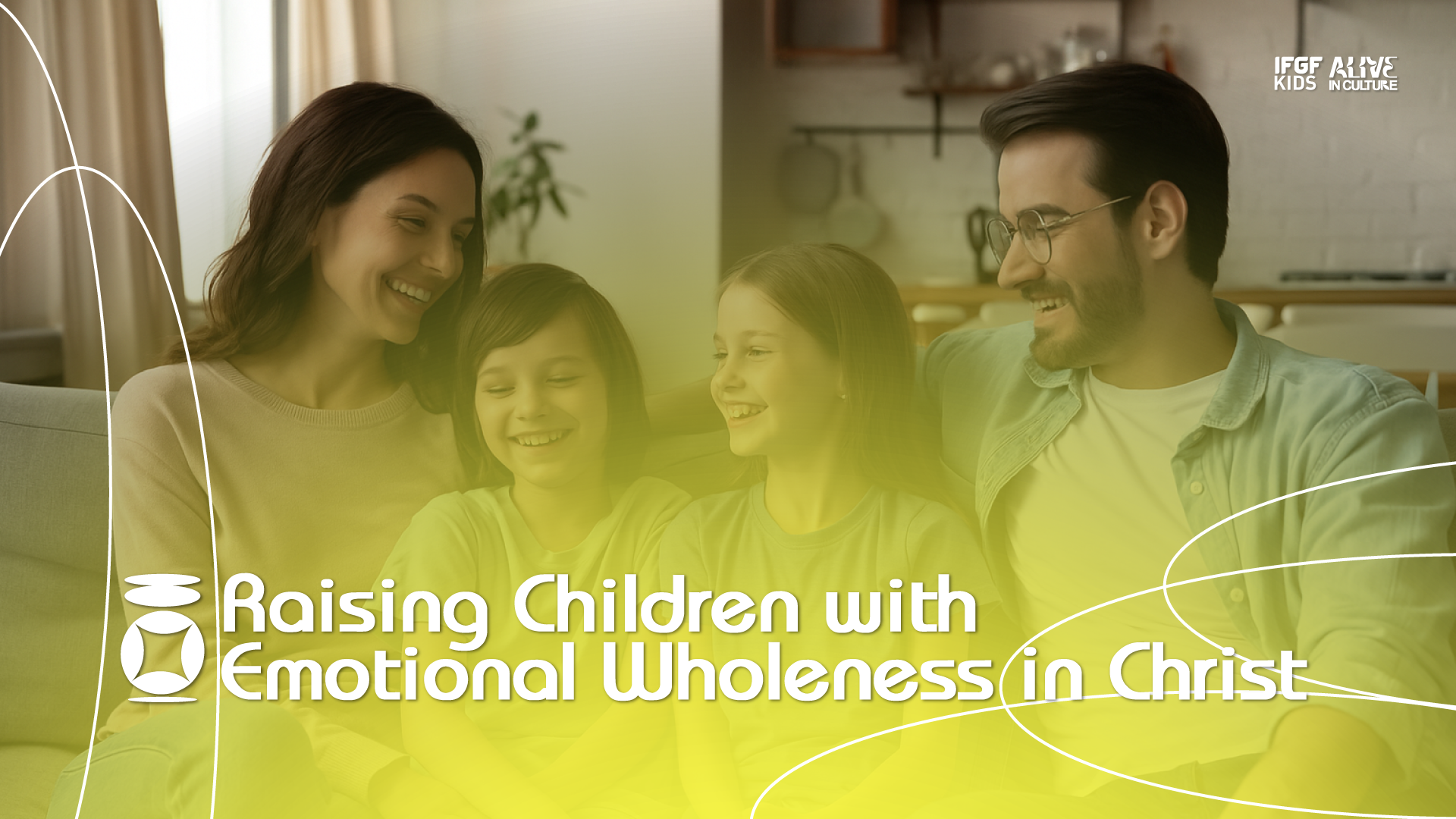RAISING CHILDREN WITH EMOTIONAL WHOLENESS IN CHRIST
In a culture increasingly busy chasing achievements and appearances, the church needs to pause and ask: Are we shaping a generation that is healthy inside and out, or merely pushing them to appear successful?
Many children today live under pressure to appear perfect, yet they often feel tired, lonely, and unsure about where to express their feelings.
When the world values accomplishments over character, and appearance over authenticity, we are reminded that our task is not only to raise children who behave well but also to nurture those who are whole at heart. They need guidance not just morally, but also emotionally and spiritually.
We are not preparing them to live in an ideal environment, but in the real world, which is full of challenges, wounds, and struggles. Therefore, we cannot focus solely on skills and discipline. We also need to help them develop emotional maturity that grows from knowing God’s love and truth.
Not Just Good, But Ready to Face Life
As parents and spiritual leaders, we are not only called to teach children to memorize Bible verses or behave well, but to introduce them to real life. A life that knows tears, anger, disappointment, fear — but also hope and the presence of God.
A whole child is not a child who never cries, never gets angry, or always seems okay. A whole child knows who to turn to when their heart feels heavy.
A child who learns to manage anger without hurting others, recognizes sadness without losing hope, brings fear to God, and finds joy that doesn’t depend on circumstances. Even the feeling of disgust can be the beginning of forming moral boundaries. The child learns to reject what is evil and protect what is holy — not out of fear of punishment, but because of the principle of truth they hold on to.
Allowing children to feel and express emotions doesn’t mean letting them be ruled by emotions. On the contrary, through this process, they learn to submit every emotion to the guidance of the Holy Spirit.
The mind governed by the flesh is death, but the mind governed by the Spirit is life and peace.
(Romans 8:6 NIV)
Jesus and Emotions
Jesus Himself experienced and openly expressed a wide range of emotions. He wept at Lazarus’ tomb. He became angry in the temple. He was deeply afraid and sorrowful in Gethsemane. He also rejoiced in fellowship with the Father. All of this shows that emotions are part of our humanity, created by God, not something that must be suppressed or ignored.
If our Savior did not avoid His emotions, why do we often demand that children calm down quickly, recover quickly, or obey quickly?
In honesty with their emotions, children discover that God is not only holy and righteous but also close, understanding, and caring. It is there that they begin to truly know His heart.
“The Lord is close to the brokenhearted and saves those who are crushed in spirit.”
(Psalm 34:19 NIV)
God’s Word also shows that emotions can draw people closer to Him. In fear, we learn dependence. In sadness, we experience comfort. In anger, we learn justice and forgiveness. In disgust, we build boundaries between what is unclean and what is holy. And in joy, we find true spiritual strength to face all emotions.
“The joy of the Lord is your strength!”
(Nehemiah 8:10 NIV)

Helping Children Manage Their Emotions Wisely
Building emotional wholeness does not happen in a single conversation. It is a repeated process filled with patience, forgiveness, and consistent love. Here are several ways to support this, both in the family and in the church:
1. Encourage children to pray honestly
Encourage children to speak to God as they truly are. Help them learn that God listens not only when they are thankful, but also when they are disappointed, afraid, or angry.
2. Provide space for movement and play
The body has natural ways to process emotions. Free play, running outdoors, dancing, or light exercise can help release emotional tension.
3. Help children name their feelings
Instead of immediately saying “don’t be angry,” ask, “Why are you feeling angry?” Helping children recognize and name their emotions helps them to manage them better.
4. Practice breathing techniques and quiet time
When a child starts to feel overwhelmed, guide them to sit quietly, take deep breaths, and count to ten. This simple practice is very effective in helping them regain control.
5. Use creative expression
Allow children to draw, write, or role-play as a way to express their feelings. This provides a safe and positive outlet for their emotions.
6. Be a safe place to return to
Parents and spiritual leaders need to be loving figures—not perfect, but present. When children know they can return without being judged, they will learn from mistakes more easily.

The Church as a Healing Space
The church is called to be a space of restoration, not merely a place for shaping behavior. Children need to know that they can feel fear without being seen as weak, cry without being pressured to be strong immediately, and still be accepted when their hearts are full. In such a place, they learn that God does not distance Himself from their struggles, but is present with real, tangible love.
Emotional wholeness does not mean living without turmoil, but being willing to recognize every emotion, manage it wisely, and surrender it to God. Children are not called to be perfect, but to be whole—whole in their feelings, whole in their identity, and whole in their relationship with Christ.
This is our calling: to partner with God in shaping a generation that is not only strong outwardly, but also emotionally healthy. Children who are not afraid to feel, not ashamed to cry, and not lost in anger, because they know where to bring it all. They learn that emotions are not weaknesses, but spaces to encounter God who shapes their hearts. As the psalmist prayed, so we and our children learn to open our hearts fully before God:
“Search me, O God, and know my heart; test me and know my anxious thoughts.
See if there is any offensive way in me, and lead me in the way everlasting.”
(Psalm 139:23-24 NIV)

May God help every parent and church leader to accompany children with love, patience, and understanding. May God first restore us from our own emotional struggles. And may every child we guide grow into a whole person, rooted in the love of Christ, and walk in the way of eternal life.
Source: Luciana Christina (IFGF Kids Global Team)


